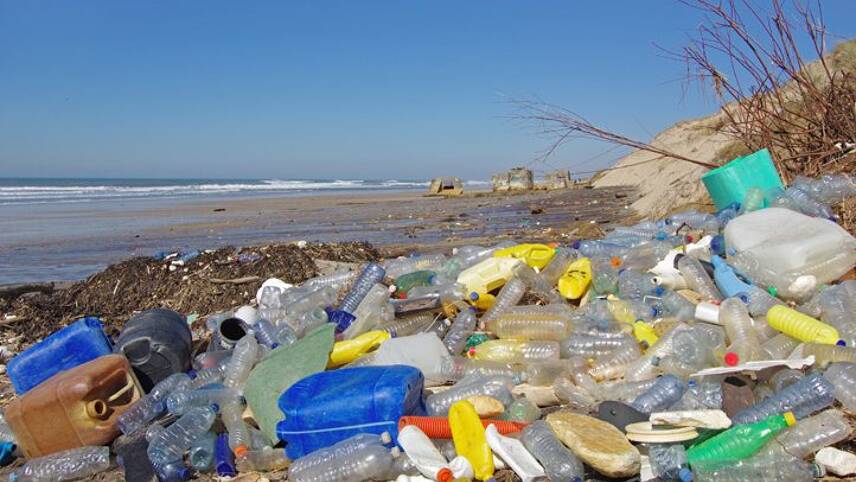Register for free and continue reading
Join our growing army of changemakers and get unlimited access to our premium content

The UK has declared war on plastic waste. From tiny microbeads that wash off of cosmetic products to the coffee cups synonymous with a linear economy of take, make, dispose, it seems that policymakers are aiming down the crosshairs to eliminate plastic waste.
At first glance, this is a welcome step. The new 25 Year Environment Plan is aspirational in scope, and what it lacks in terms of clear regulation, it makes up for with a declaration that the way the nation produces, imports, uses and disposes of plastic is set for an overhaul.
It also builds on the Environmental Audit Committee’s (EAC) call for a 25p surcharge on coffee cups – the pithily-named “latte levy”. The 25p surcharge on disposable cups was the main attraction of the EAC’s recent 37-page report which examined how the Government, retailers and the wider UK public could restrain and reduce the 2.5 billion paper coffee cups, lined with plastic interiors, that are discarded each year.
As with most things that fall under the sustainability spectrum, there is no silver bullet when it comes to reducing the amount of plastic waste – coffee cups or otherwise. While the recommendations from EAC and the aspirations of the Government are of course welcome – and at the very least created much more awareness on the issue – one can’t help but feel the trigger is facing the wrong direction.
Yes, a 25p levy will likely reduce the amount coffee cups that are purchased, and therefore end up in landfill. Yes, high-level declarations from the Prime Minister will help spur the debate. But, as the EAC report duly points out, a radical shift in producer responsibility, design standards and infrastructure are needed – and needed fast – if we are to win this war on waste.
One of the major calls from the EAC – which has since been echoed by Tesco and the retailer’s willingness to champion deposit-return schemes for plastic packaging – is to overhaul the Producer Responsibility Obligations (PROs) system. The system creates a legal obligation for packaging producers to ensure that a proportion of their marketed products are recovered and recycled. Businesses can show evidence of their compliance by purchasing Packaging Recovery Notes (PRNs).
Unsurprisingly, this recommendation was eclipsed by the consumer-facing aspects of plastic packaging. But a revamp to the PRO could act as the hidden hero in the battle to reduce plastics.
Current PRN purchases average around €20 per tonne, but other European nations have an average of around €150 per tonne. PROs from UK business currently contribute to just 10% of the cost of waste disposal, with taxpayers paying the remaining 90%. According to the Local Government Association, this limited compliance scheme generated £111m in 2013, of which just £37m went towards collection. In contrast, it costs local authorities £550m to collect and sort packaging material. There’s hardly an incentive for producers to lobby for change here.
Retailers will tell you that they want to reduce their reliance on plastics, organisations like the Environmental Services Association (ESA) will claim that current recyclers have the capacity and the infrastructure to recycle the growing mountain of plastics. Innovators will also be knocking at the door, attempting to scale-up the next reusable cup or biodegradable bottle solution. In this regard, the stars are very much aligning.
The Government acknowledges these factors, yet keeps its gun firmly focused on consumer-facing solutions; a tax here, a levy there. Perhaps it’s because these measures are more visible to the public, but policymakers are at risk of drowning in a sea of plastic; instead of plugging the leak, we are equipping ourselves with buckets.
It is apparent that Defra wants to build on the success of the 5p charge on plastic bags – now set to be rolled out to all shops – which has reduced use by as much as 86%. But it is argued that what worked for weekly food shops likely won’t have the same impact for sporadic visits to and from coffee stores.
So, what is the ideal solution? Has this problem been successfully tackled elsewhere?
For one, we can look to how well deposit-return schemes have worked globally – in Scandinavia, for example, where carton recycling is now at around 90%. The fact that major companies like Tesco and Coca-Cola endorse that approach is welcome, but the Government is yet to truly back it.
There is also a slightly less obvious example that could be looked at: that of the UK’s transport sector, which seems to have grasped this ‘cause-over-symptoms’ approach in recent times. One of the major causes of high transport emissions is diesel vehicles. Rather than looking to improve the environmental impacts of diesel cars and vans, or develop new solutions that improve air quality, the Government has addressed the cause with a ban on new diesel vehicles set to come into force by 2040 (whether that’s soon enough is another debate entirely). Carmakers are therefore impelled to tackle the same cause, and low and zero-emission vehicles are now being developed at a faster rate than ever before.
Thankfully, the Government has stepped up and addressed the cause of plastic waste – too much plastic. But where the transport industry had an immediately available alternative to turn to in electric vehicles, the alternatives to plastics retailers and manufacturers are perhaps less clear. It will therefore be vital that the industries work together to bridge the gap between innovators and incumbents to allow solutions to emerge. Bio-based plastics account for less than 1% of global plastics production. Now is the ideal time to increase this number. Obviously, the steps to commercialisation for solutions to this issue are a minefield to navigate, but in the absence of a PRO reform, business will, again, have to spearhead the change.



Please login or Register to leave a comment.